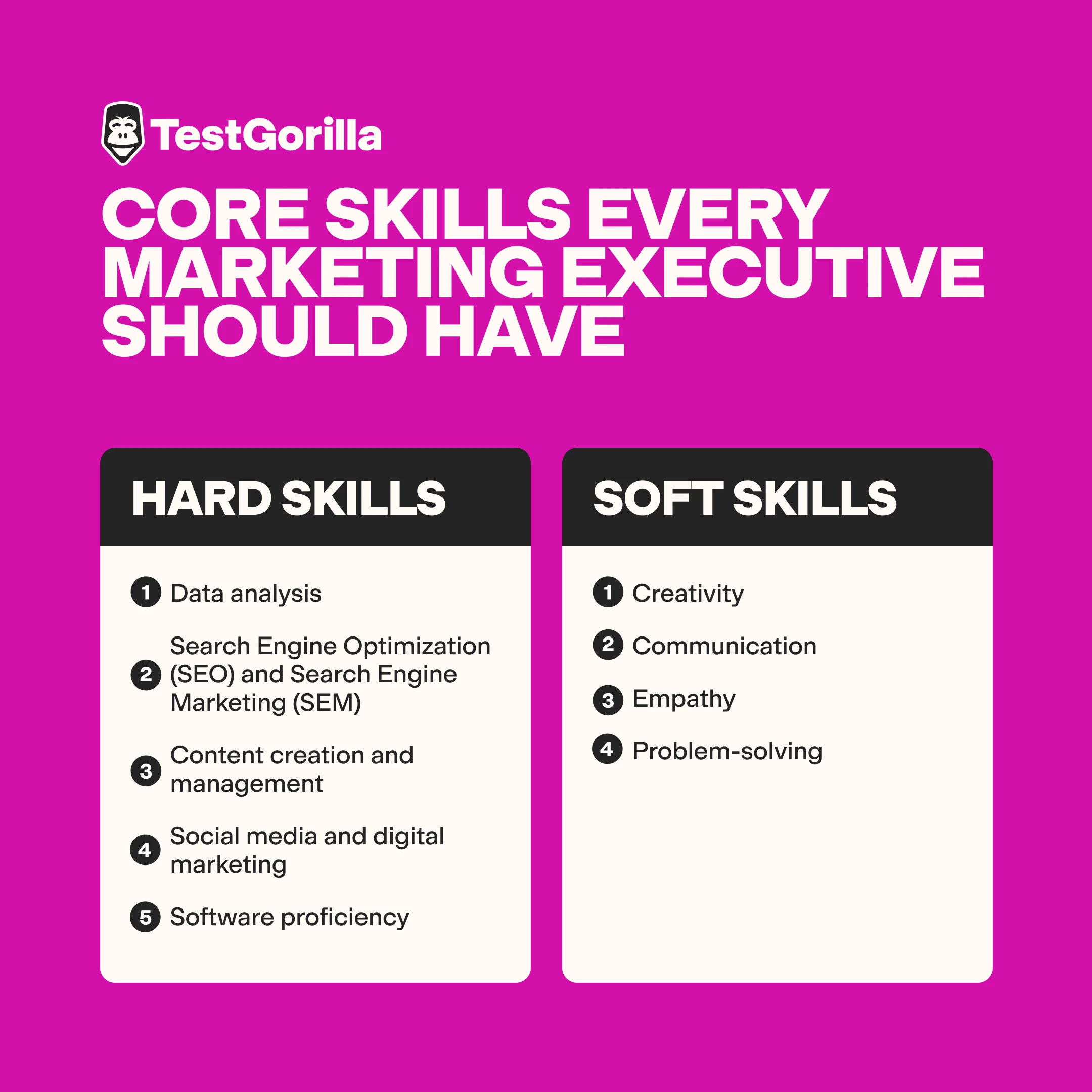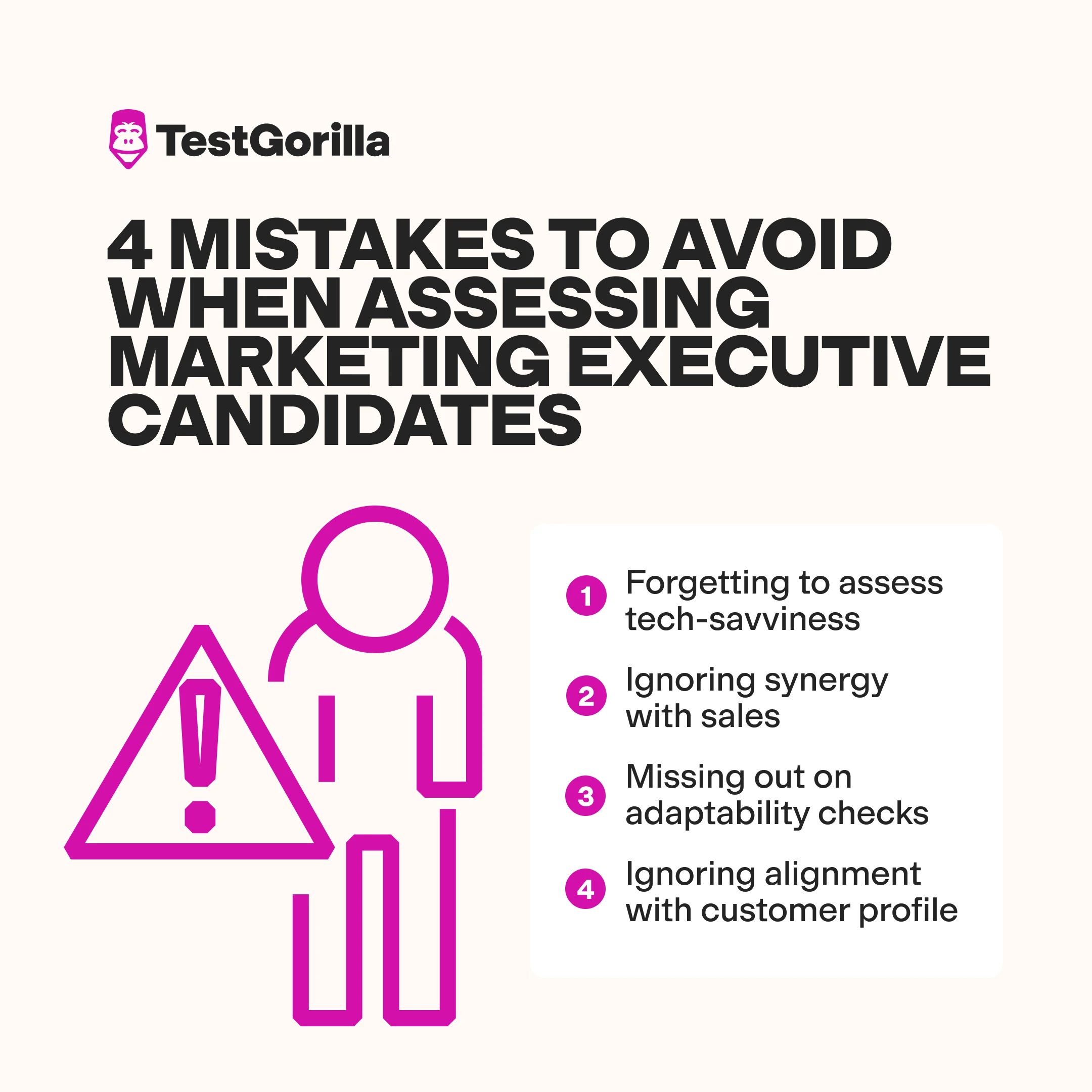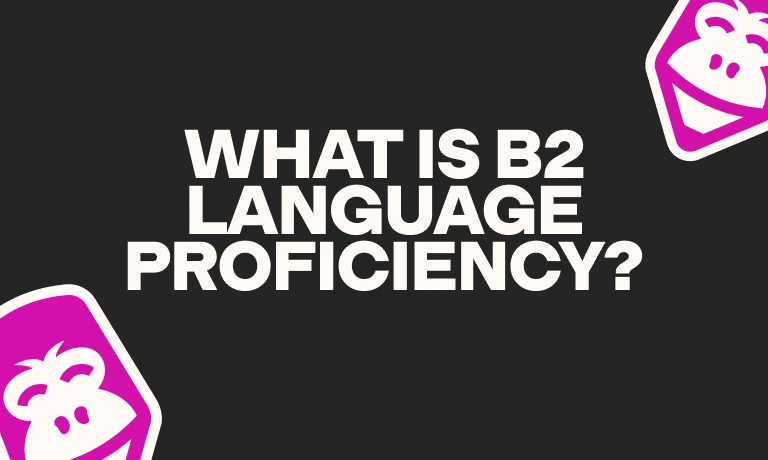Finding the perfect marketing executive can be tough. A top-notch exec will make your products shine, build up your brand, and turn curious folks into buyers. But choosing the wrong person? That can waste your budget, slow you down, and leave customers unimpressed.
It’s tricky to know what skills to look for when hiring for this diverse role – and pretty easy to get it wrong. But no stress: We're here to help!
In this article, we break down nine essential skills to look for in marketing executives and show you how to spot the best ones out there.
What is a marketing executive?
A marketing executive is the go-to person for promoting a company's products or services.
Day to day, they’re the brains behind marketing plans and strategies. They team up with other departments, such as sales and product development, to make sure all marketing efforts align with the company's goals.
From crafting ads and running social media to digging into market research, marketing executives are always adjusting their game to connect with customers.
And that’s not all. They also work with outside teams, like creative teams and media buyers, to make sure all parts of a campaign click together smoothly.
In a nutshell, marketing executives boost brand recognition, drive sales, and make sure the company’s offerings hit the mark with customers’ needs and preferences.
Core skills every marketing executive should have
Marketing executives who can really make a difference will have these essential skills:
Hard skills
Data analysis: A marketing executive needs to slice and dice data to figure out what's working and what’s not. This helps them fine-tune strategies and meet campaign goals.
Search Engine Optimization (SEO) and Search Engine Marketing (SEM): Good marketing execs know how to optimize your content so it not only looks good but also ranks high in search engine results.
Content creation and management: The best marketing execs are skilled at writing and managing content – such as blogs, emails, and social media posts – that hooks readers and keeps them coming back for more.
Social media and digital marketing: It’s one thing to post on social media and other platforms; it’s another to really engage and grow your audience. A great exec will know how to use platforms like Facebook, Linkedin, and Instagram to create a community, run marketing and pay-per-click campaigns, and convert followers into paying customers.
Software proficiency: Familiarity with tools like customer relationship management (CRM) platforms, website builders, email marketing platforms, and SEO tools helps marketing execs streamline tasks and focus on creating killer marketing campaigns.
Soft skills and behavioral traits
Creativity: Fresh ideas are what set a brand apart. A creative marketing executive can think outside the box to make campaigns that are memorable, engaging, and stand out online.
Communication: Whether marketing execs are explaining a new campaign to the team or pitching ideas to higher-ups, clear and persuasive communication is key to making things happen.
Empathy: Empathetic marketing executives can imagine themselves in the customer’s shoes, helping them craft content that resonates and builds strong connections.
Problem-solving: Marketing execs often face challenges like tight deadlines, budget constraints, or low engagement rates. A strong problem-solver can navigate these obstacles and find innovative solutions to keep campaigns on track and effective.
The best insights on HR and recruitment, delivered to your inbox.
Biweekly updates. No spam. Unsubscribe any time.
How to assess marketing executive candidates
Knowing which skills to look for is just the start when hiring a marketing executive. Next, you’ll want to make sure each candidate really has what it takes to succeed.
That’s where TestGorilla’s talent assessments can help.
We offer 400 multi-measure tests that let you evaluate candidates’ hard and soft skills, personality traits, cognitive abilities, and more. This way, you can make confident hiring decisions based on hard evidence, not assumptions.
You can add up to five TestGorilla tests to a single assessment. Below, we cover the ones that are ideal for assessing your marketing executive candidates.
Evaluate hard skills
First, check out these tests that measure your candidates’ technical skills and know-how:
TestGorilla’s Marketing Analytics test shows whether applicants can gather relevant marketing data, analyze it correctly, and use insights to drive your company’s marketing campaigns.
Our SEO tests let you assess candidates in all things SEO – copywriting, linking strategies, tactics to increase website traffic, and more.
The LinkedIn Advertising test – as well as our Instagram Marketing test and TikTok Marketing test – evaluates candidates’ ability to run successful digital campaigns and grow your company’s online presence.
TestGorilla’s Branding Strategy test helps you see how candidates define, position, and grow your company’s brand.
Our HubSpot CRM, Zoho CRM, and Salesforce CRM tests make it easy to evaluate candidates’ familiarity with CRM software.
Dive into candidates’ soft skills
Next, roll out some situational judgment and personality tests to ensure your candidates have the soft skills required for the marketing executive position.
Try these from TestGorilla:
Our Communications (intermediate) test is the total package for evaluating applicants’ ability to communicate with the marketing team, other departments such as sales and product, and even your customers.
Our Design Thinking test is an all-in-one assessment that helps you check for skills and traits including empathy, customer focus, creativity, and problem-solving.
The 16 Personalities test and other personality assessments give you a full picture of who candidates are, what makes them tick, and whether they’ll mesh well with your team.
Elevate hiring decisions by checking for motivation and culture-add
In addition to hard and soft skills, use these tests to check if your candidates will gel with your company’s people and working practices:
TestGorilla’s Culture Add test helps you learn more about your candidate’s core values and attitudes. All you need to do is complete a quick survey, ranking your company’s values. Candidates then take the same test so you can see if they’re a good match.
Our Motivation test also uses a custom survey both you and your candidate fill out to see if their job expectations match what you’re offering. That way, everyone’s on the same page as you move forward in the hiring process.
Dig deeper with behavioral interviews before making the final call
While talent assessments tell you a lot about your candidates’ skills, behavioral interviews let you understand more about their backgrounds, experiences, and attributes.
Consider asking questions like these:
Can you describe a time when you had to adjust a marketing campaign based on data?
This helps you see whether candidates can use data to make informed decisions and tweak their strategies accordingly.
Can you tell me about a successful product launch you managed? What was your strategy, and how did you measure its success?
This question checks candidates’ experience with product launches, strategic planning skills, and knowledge of tracking success using key performance indicators (KPIs).
Need more ideas? Check out our blog post with 50 interview questions for marketing managers for inspiration.
4 mistakes to avoid when assessing marketing executive candidates
To find a great marketing executive, avoid these common blunders when evaluating your candidates:
1. Forgetting to assess tech-savviness
Today’s marketing executives need to be at the forefront of adopting technologies like AI-driven analytics. When interviewing, ask your candidates for real-life examples of the latest tech they’ve used. Otherwise, you risk hiring someone who struggles to use modern tech to boost your marketing efforts.
2. Ignoring synergy with sales
Marketing and sales go hand in hand. If you don’t discuss with candidates how they’ve worked with sales to make money, you might end up with strategies that don’t convert to actual sales. So, ask your marketing exec candidates how they’ve teamed up with sales teams before and what results they achieved.
3. Missing out on adaptability checks
Marketing execs need to handle shifts in the market effectively, or else your marketing strategies could get old fast.
During an interview, ask them about times they’ve had to quickly alert their marketing plans because of new trends or competition – and discuss what happened next. Also, add a test that measures adaptability to your marketing executive talent assessment!
4. Ignoring alignment with customer profile
Understanding your customer base is essential for any marketing executive. In fact, Peter Drucker, commonly known as the father of modern business management, once said, “The aim of marketing is to know and understand the customer so well the product or service fits him and sells itself.”
In interviews, ask candidates how they’ve tailored marketing strategies to fit different customer groups’ needs and preferences. Doing so helps you find someone who genuinely understands different audiences and can connect with customers.
FAQs
Looking for more information? Read our answers to some frequently asked questions.
Is marketing a stressful job?
Marketing is exciting, but yes, it can get stressful, especially when teams face tight deadlines, handle crises, or react to market changes. It’s a good idea to hire people who thrive under pressure and ensure your team is well-resourced and supported.
How much should I pay my marketing executives?
It really depends on the industry and location. But to give you an idea, Indeed reports the average salary for marketing executives in the US is around $67,528.
What’s the difference between a marketing executive and a marketing manager?
A marketing executive usually handles specific tasks and campaigns, while a marketing manager oversees the whole marketing team and strategy. Think of the executive as doing the legwork and the manager as calling the shots.
Planning to hire a marketing manager? Check out our blog posts about how to hire marketing managers and how to write a marketing manager job description.
Hire the best marketing executives with TestGorilla
Finding the right marketing executive isn’t always easy. A standout marketing exec doesn’t just meet the basics – they bring a mix of tech smarts, creative flair, and a keen sense for what your customers want.
If you’re on the hunt for a pro marketing executive, don’t rely on resumes or interviews alone. TestGorilla’s talent assessments will help you assess candidates on critical skills, personality traits, and more so you can hire someone who truly matches your needs.
Ready to find your perfect marketing executive? Check out our full range of tests, book a live demo, or create a free TestGorilla account today!
You've scrolled this far
Why not try TestGorilla for free, and see what happens when you put skills first.
















